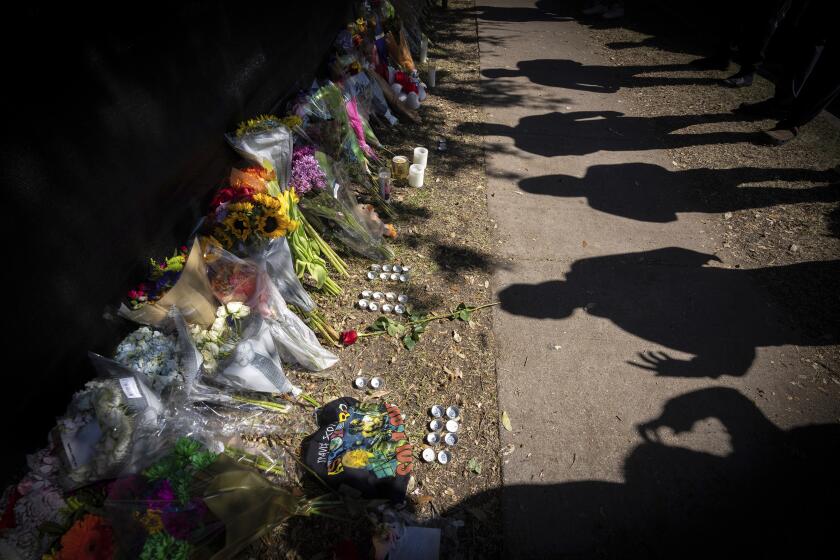Role Countering Iran Boats Seen for Coast Guard
The Reagan Administration is considering assigning Coast Guard patrol boats to help U.S. naval forces protect shipping in the Persian Gulf, Adm. William J. Crowe Jr., chairman of the Joint Chiefs of Staff, said Sunday.
Crowe told an interviewer that the Pentagon may use the boats to guard against future aggression in the gulf by the badly damaged Iranian fleet, which he said is now reduced to carrying out speedboat attacks, such as one it launched against a Saudi Arabian-owned tanker earlier Sunday. That attack slightly damaged the 37,011-ton Sea Trader but caused no injuries to the crew, the tanker’s skipper reported. (Story on Page 8.)
“The Coast Guard has a patrol boat that is particularly appropriate for (defending against) those types of operations,” Crowe said in an appearance on the CBS program “Face the Nation.”
Would Free Navy Ships
Defense Secretary Frank C. Carlucci, appearing on ABC’s “This Week With David Brinkley,” said that use of Coast Guard vessels would free the Navy’s larger ships for other missions, but he confirmed Crowe’s remarks that no decision has yet been made on their use.
Both the admiral and Sen. John Glenn (D-Ohio), a Senate Armed Services Committee member interviewed separately on the Brinkley program, agreed that the purpose of the U.S. military presence in the Persian Gulf is to protect that region’s oil reserves, estimated by Crowe at 60% and by Glenn at 70% of the world’s total.
President Reagan warned Iran on Saturday that further attacks in the gulf by the Tehran regime and refusal to make peace in its 7 1/2-year war with Iraq would prove “very costly.” Reagan nevertheless emphasized U.S. neutrality in the Persian Gulf War.
The United States does not want to see the region’s oil reserves “come under the domination of either an ayatollah or a commissar,” Glenn declared, adding: “We can talk freedom of the seas, but we’re not keeping freedom of the seas for Iran, so, obviously, we’re tilting toward Iraq.”
This was emphatically the view of Iran’s ambassador to the United Nations, Mohammed Mahallati, who asserted on the Brinkley panel that the United States is “trying to save the Iraqi regime” through its presence in the gulf. He denied that Iran placed the mines that heavily damaged the U.S. frigate Samuel B. Roberts on April 14 and also disclaimed responsibility for Sunday’s attack on the Sea Trader.
“But we have said, very candidly, that either the Persian Gulf should be safe for all or for none,” Mahallati declared.
Carlucci dismissed the ambassador’s denial as “absurd.” He said that U.S. forces photographed mines retrieved from the gulf last week and that the devices had serial numbers that sequentially follow those removed from the Iran Ajr, an Iranian naval vessel captured in the act of laying mines in the gulf late last year.
“We know Iran is laying mines,” the defense secretary said.
None of the participants in the Sunday talk shows provided exact definitions of what all of them accepted as an expanded mission for American forces in protecting Persian Gulf shipping.
‘Not a Finished Policy’
Sen. John W. Warner (R-Va.), appearing with Glenn, said that the policy is “not a finished policy.” Carlucci and Crowe have assured congressional leaders that there will be further consultation on the matter.
“We should afford some protection, particularly to U.S.-owned but foreign-flagged vessels, those vessels that actually bring the petroleum to the shores of the United States,” Warner, a former secretary of the Navy, said. But he cautioned that “we cannot provide blanket protection to everybody” and said that naval escorting services should be offered “on a selective basis--and don’t announce where and when we may do it.”
Glenn agreed with the need for expanded protection, calling it “ludicrous” from its start last July to have restricted naval escort to 11 Kuwaiti-owned tankers that were re-registered under the American flag. Glenn called on the Administration to pursue parallel measures, with emphasis on enlisting U.S. allies in moves to cut off arms supplies to Iran.
Discounts Shooting War
Glenn dismissed fears that getting tougher with Iran could involve the United States in a shooting war.
More to Read
Start your day right
Sign up for Essential California for news, features and recommendations from the L.A. Times and beyond in your inbox six days a week.
You may occasionally receive promotional content from the Los Angeles Times.





